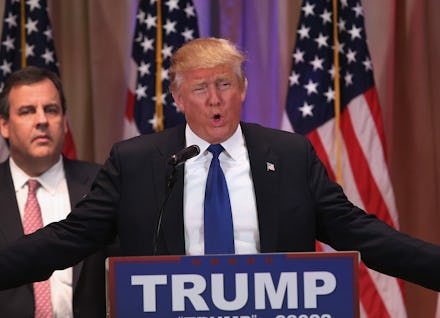Super Tuesday Showed That Sanders' "Political Revolution" Actually Belongs to Trump

The Republican nominating contests on Tuesday attracted millions more voters to the polls than the primaries and caucuses on the Democratic side of the aisle. The disparity fit a larger pattern observed in the 2016 cycle, but should it worry Democrats hoping to hang onto the White House for a third consecutive term?
According to tallies kept by NBC News, upwards of 8.3 million people voted in the Republican contests in Alabama, Arkansas, Georgia, Massachusetts, Oklahoma, Tennessee, Texas, Vermont and Virginia. Meanwhile, only about 5.6 million people voted in those states' Democratic contests.
Overall, the Washington Post noted, Republican primaries and caucuses have drawn about 1.1 million more voters than Democratic contests this year. Democrats have outpaced Republicans in only three states: Nevada, Massachusetts and Vermont. The latter two are deep-blue states, so you'd expect more Democrats than Republicans to vote there.
But the disparity in turnout is particularly disappointing for Sen. Bernie Sanders, who hoped that his progressive challenge to Hillary Clinton would fuel a "political revolution" and lure millions of long-disillusioned voters to the polls. Instead, Donald Trump appears to be driving a similar kind of political revolution, bringing millions of disaffected Republican voters to the ballot box to register their disgust with the political system.
What explains the disparity? Democrats have lagged furthest behind in Southern states like Texas, Alabama, Georgia, Tennessee and South Carolina. Those are all solidly Republican states, so the higher Republican turnout there is hardly surprising. Since Democrats aren't expected to seriously compete in those states in the general election, more Republicans voting there shouldn't set off alarm bells about an enthusiasm gap.
Another notable factor about those contests: Clinton entered each with a commanding lead in the polls, and she won them all handily, thanks to her overwhelming support among minority voters. The lack of suspense on the Democratic side may well be holding down turnout, a phenomenon that's likely to repeat itself as the conventional wisdom that Clinton's nomination is inevitable crystallizes.
But you can't discuss the vast gulf in turnout without acknowledging the transformative role of Donald Trump, the Republican frontrunner. Capitalizing on anti-establishment discontent, populist billionaire has attracted millions of new or long-dormant voters to the GOP fold, including working-class whites and disaffected Democrats. As Democrats look to stave off the GOP in Rust Belt states like Ohio, Pennsylvania and Michigan this fall, Trump's strength with those voters could spell real trouble.
Trump touted that appeal during a Tuesday night press conference in Palm Beach, Florida.
"I think we're going to be more inclusive...more unified, and I think we're going to be a much bigger party," Trump said. "[The GOP] has become more dynamic. It's become more diverse. We're taking from the Democrats."
So much for that "revolution." While Sanders has crushed Clinton among first-time and millennial voters, his campaign has failed to inspire the 2008-level turnout that propelled then-Sen. Barack Obama to victory over Clinton. As the Post highlighted, Democratic turnout has declined in every contest since the record-breaking 2008 primary battle — even in New Hampshire, where Sanders routed Clinton by 22 points.
That Sanders hasn't generated greater turnout — and has also failed to make inroads with minority voters, even after showing strength in Iowa and New Hampshire — goes a long way toward explaining why Clinton is well on her way toward becoming the Democratic nominee.
Sanders seems to see the writing on the wall, even while he stands a good shot of adding a few states to his win column as the contest moves to friendlier terrain.
Speaking to supporters in Essex Junction, Vermont on Tuesday night, the senator said, "This campaign is not just about electing a president. It is about transforming America."
With his unabashedly progressive platform on income inequality, campaign finance reform and Wall Street regulation, Sanders has already gone a long way in transforming the Democratic Party's internal debate. America, meanwhile, looks likelier to be jolted by a political revolution of a very different kind.